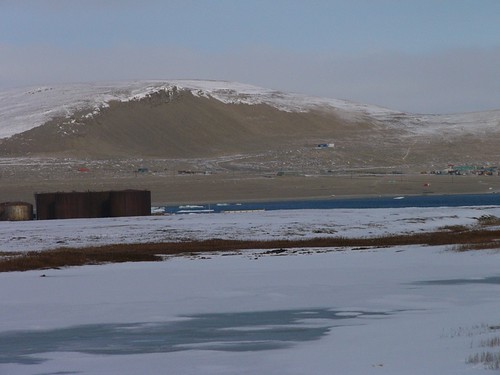
The snow in Resolute howled on as the company inside the East Bank Inn finished their most most recent time-waster.
"Whew!", said Jules. "'Scuse me, folks, I'm a bit parched. That was a longer story than I expected." He got up and headed for the kitchen.
"Nice story," Paul said, nodding. "Kinda makes you want to start playing soccer, so that you'd be able to speak a common language if you ever end up in Europe without money or friends or a passport."
Darryl pointed an accusing finger at his friend. "Hah! You're just saying that because that's what happened to you last year!"
Paul laughed at that, and everyone joined in, although Montreal and Eddie exchanged confused glances.
"By the way," asked Montreal, "what sort of sports do you guys like to play up here? Hockey? Skiing?"
Harry shook his head. "The ocean doesn't freeze, and we can't afford to use that much water for a rink. As for skiing, well, we've got cross-country skiing, but downhill skiing is purely a rich tourist's sport. We've got dogsledding, though, and snowmobiling, and quadding, and hunting. That takes up most of our outdoors leisure time."
"Well, yeah, but that doesn't sound too different from non-leisure time around here."
"No, I guess it isn't. Well, the Inuit games are popular, too."
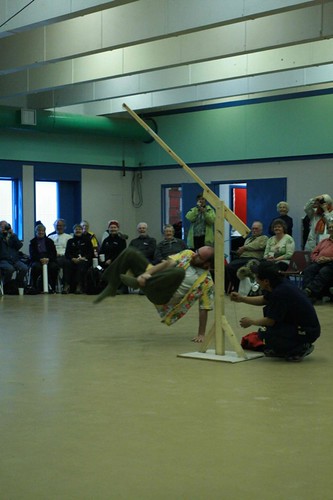
"Inuit games?"
"Oh, those are a lot of fun, and really big with the kids. All sorts of events, but most have to do with high kicking or wrestling or just plain toughness. Lots of reputations are at stake during the Inuit Games."
"So, are these games based on traditional skills?"
"No, they're just something we came up with a few years ago. So, what about you guys? Any sports?"
Montreal thought about that. "Well, I work out - you know, exercise, treadmills, pilates, that sort of thing. I ride my bike when the weather's good. During the winters, I, um... ski." She blushed a bit.
Harry blushed right back. "Oh, sorry! No offense about that "rich person's sport" comment, right? I mean, I was just talking about how much it costs to go skiing in Resolute..."
"Oh, don't worry about it. You're right, it's quite a bit easier to ski where I'm from, and it's not cheap to operate those ski slopes. I wouldn't want to guess how much it would cost to build a chair lift up here."
"Yeah, that's what I meant. So, how about you, Eddie?"
The young man shrugged. "I stay indoors, mostly. I'm not too bad at Team Fortress, though."
"Team Fortress?"
"Video game."
"Ah."
Eddie could feel the conversation dying quickly. "Um, I also... well, does art count?"
"If it gets you outside and moving, then sure."
"Okay... well, what about carving?"
"Really?" Harry leaned forward in his chair. "Do tell! What sort of stuff do you carve?"
"Yeah! It's your turn for a story, anyway!", added Paul.
"Whose story, now?" Jules had just come out of the bathroom.
"Eddie's going to tell us about his carvings!"
"Oh, that sounds good. The artist's perspective, eh?" Jules eagerly took a seat.
Eddie rubbed his hair nervously. "Um... y'know, it's not like I've got a good carving story, like, it's not like I ever carved a wolf head out of a tree to stop a stampede, or anything... let me think." Eddie got up and started pacing around.
"What's the--" Harry was shushed by Montreal.
"Give him a minute," she scolded.
"Okay. Okay. I think I've got something. I know one of the Inuit carving legends, but I have to set it up with what little I know about it. If anybody feels like correcting me, they can jump in any time."
Harry spread his hands. "The floor is yours."
"Oh. Well, thanks. Okay..." he coughed, and took a deep breath.
"Carving. Carving is one of the few subtractive arts. With painting, or music, or writing, or even dancing, you're creating something out of nothing. But with carving, you end up with less than when you started. Since you're always taking away, I like to think that that means that carvers have a much better vision of their end product than any other artist -- everything has to be planned and anticipated, through all the steps. You can't redo a bad decision, and you can't improvise halfway through and still end up where you wanted to.
"And yet, carvers are unable to plan ahead completely. A vein or a fissure inside a rock, or a fracture in an antler can force a carver to change those meticulous plans without warning.
"Inuit carvers have brought these two aspects together into a single philosophy, that coincides with their overall world, as well. I think that's why I'm so impressed, and inspired by their works.
"You see, they believe that there's a spirit within everything, and that spirits can change bodies over time. Polar bears become humans, and seals become geese, and fish become wolves, and caribou become rocks... it can go in any direction. Now, I'm not sure exactly how a rock dies, so that its soul goes somewhere else. Or how a rock is born, for that matter. My own theory is that rocks serve as spiritual RAM, a buffer where the soul overflow can get dumped. But anyway, the point is that rocks can have animal spirits inside them.
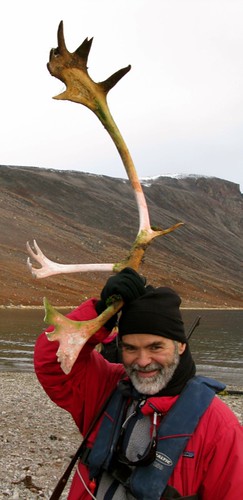 "Now, the carver's job, then, is to tell what sort of spirit is inside the rock they're carving, and help bring it out. If it's a beluga spirit, they carve a beluga. If it's a human spirit, they carve a man. And sometimes, they only find out enough about the spirit once they're already midway through carving. And sometimes... it's an evil spirit. One of the great challenges for carvers is being able to tell if it's an evil spirit in time. When that happens, part of the carving has to be left unfinished, to trap the spirit inside the rock. Not only is this difficult to determine, but carvers will often have too much pride to leave a carving unfinished. That makes purposefully unfinished carvings very valuable.
"Now, the carver's job, then, is to tell what sort of spirit is inside the rock they're carving, and help bring it out. If it's a beluga spirit, they carve a beluga. If it's a human spirit, they carve a man. And sometimes, they only find out enough about the spirit once they're already midway through carving. And sometimes... it's an evil spirit. One of the great challenges for carvers is being able to tell if it's an evil spirit in time. When that happens, part of the carving has to be left unfinished, to trap the spirit inside the rock. Not only is this difficult to determine, but carvers will often have too much pride to leave a carving unfinished. That makes purposefully unfinished carvings very valuable."Now, I've never carved anything out of soapstone. I usually just use wood, or sometimes antler. In those cases, it's a pretty safe guess that either tree or deer spirits are involved.
"But I did see one carving, once, which was actually on display at the National Gallery. But how it started was very different from how it ended up. It was a large, rough rock, not even polished, but it had a fissure in it, about a centimetre thick and five centimetres deep..."
Eddie settled back in his chair, and the tone of his voice changed, like he was back on familiar ground. He continued...
"The sculptor who had chosen it was getting ready to cut it in half to make two sculptures, but halfway through cutting, he could tell it was the home to an evil spirit. Now, I don't know my spirits, but it seems pretty clear to me that for it to be that visible after only a single cut, it must have been a great evil indeed. In fact, only a few days after cutting the stone, the sculptor fell into a deep sleep. The shaman thought that the sculptor's spirit was busy fighting the evil spirit that he'd released, and that the victor would get to keep the man's body. The shaman told this to the man's son, who was also a talented carver.
"What should I do?", he asked.
"The spirit must be trapped again," said the shaman.
"But the rock has already been opened!", he protested.
"Then it must be closed."
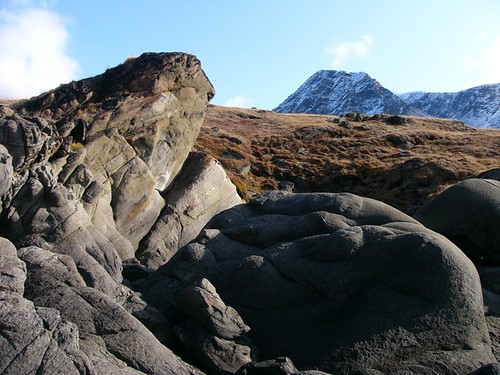 "So, the young man went out into the wilderness. He walked for many days. At first, he thought to go to the place where his father found the stone. But as he got there, he realised that the stones around here might also have some evil in them. And so, he kept walking. He then went to his favourite place to find stones for himself, but it occured to him that he should not merely seek to offer another soul in exchange for his father's spirit, for that was not kind. And so, he kept walking.
"So, the young man went out into the wilderness. He walked for many days. At first, he thought to go to the place where his father found the stone. But as he got there, he realised that the stones around here might also have some evil in them. And so, he kept walking. He then went to his favourite place to find stones for himself, but it occured to him that he should not merely seek to offer another soul in exchange for his father's spirit, for that was not kind. And so, he kept walking.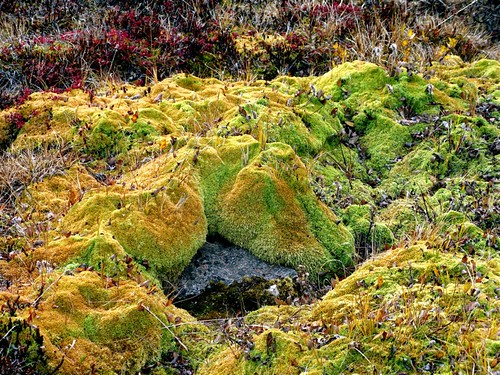 "He walked for many days, past all the names which he had known, and past all the names which his family had told him, and past all the names which his elders had told him. He walked through dead and barren lands, and he walked through the valleys which were rich with life, his boots sinking deep down into the wet moss as he trudged through.
"He walked for many days, past all the names which he had known, and past all the names which his family had told him, and past all the names which his elders had told him. He walked through dead and barren lands, and he walked through the valleys which were rich with life, his boots sinking deep down into the wet moss as he trudged through. "Finally, he came to a mountain with no name. He climbed it, and saw before him a valley with no name, and another mountain with no name far on the other side. The valley was dark and flat, and covered evenly with rocks, right from one coastline, clear through until the valley ended at a different coastline far away. He walked down the mountain to the bottom of this valley. As he had seen, rocks were everywhere, and he had to climb carefully and watch his step just to cross the valley floor. These rocks were all covered in lichen, however, which was thick and black, so thick that it didn't flake off in your fingers as lichen normally does. He left these black rocks behind, for they had a purpose -- to provide a home for the lichen, which provide a good meal for the caribou.
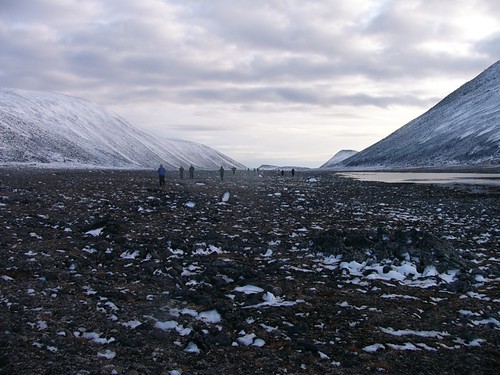
"He kept walking across this barren, empty valley. He was started to grow weary, for there was nothing to hunt in this valley. He ate some of the lichen, and made a shelter for sleep. He dreamt that he was high, high in the sky, and then he dreamt that he was not dreaming, which confused him greatly in his dream which was not a dream. But when he awoke, he understood perfectly. He made his way to the other mountain with no name, on the other end of the valley, and he began to climb.
"This mountain was much higher than the other one, and the young man was soon wading through the snow. The rocks were a rough, sharp black, and the snow was a deep, soft white. There were no other colours. He climbed through the snow, treading carefully, for the mountain itself might have opened up like the crack his father had made, and the snow would hide such a crack perfectly. At one point, he grew tired, and leaned out to a large rock, and in doing so, he fell through the snow, right up to his armpits.

He could feel nothing beneath his feet save for the sloping walls below, but he was able to climb back up. When he stood up and looked beneath him, the gravel he'd scrambled out upon was sifting down into the hole. He needed to do something similar with his father's stone, he realised, but does gravel have a spirit? Does each pebble hold the spirit of a mosquito? Or is the spirit of a mosquito just as large as the spirit of a muskox? Perhaps he had a spirit which was once that of a mosquito, he thought to himself.
"Regardless of that question, his solution would not involve gravel. Instead, he kept on walking, past the gravel and the hole, continuing his ascent until he came to a lake, resting peacefully at a plateau near the top. The lake was silent, and its surface was smooth. It was perfectly clear, and he could see straight down to the bottom.
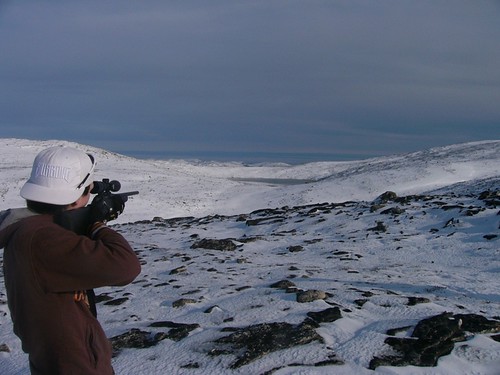 There, resting upon the bed of pebbles, was a beautiful piece of soapstone, grey like a seal's pelt, with mottles and flecks and scattered all the way through. Such a stone would have made a wonderful sculpture, but the young man wasn't here for himself, so he kept on going.
There, resting upon the bed of pebbles, was a beautiful piece of soapstone, grey like a seal's pelt, with mottles and flecks and scattered all the way through. Such a stone would have made a wonderful sculpture, but the young man wasn't here for himself, so he kept on going."Further up the mountain, he stopped for a rest. As soon as he sat down and enjoyed a long, deep breath, he felt better and at peace. He looked about him, and saw a rock the size of his open palm. A rock without a spirit, as near as he could tell. A rock made of soapstone, almost the exact same shade of greenish black as his father's stone. He picked up this rock and held it close to him. Then, he rested a while longer, and began his trek back down. He walked past the lake, and he washed the rock in its still, clear waters. He walked past the hole, and let the gravel cover the rock as it continued to trickle down to the bottom. He walked back across the valley, and wrapped the rock in the black lichen. He climbed up the other mountain, and back through the plains that were lush with moss and flowers and grasses. He tied the rock to a long rope, and dragged it behind him, and it ran along the greens and yellows and purples and browns and reds of the foliage. The rock had no spirit, but the man wanted this rock to experience the good things of the world nonetheless. Some people might have called this foolishness, but if there was a spirit in that rock, it would be far more foolish to condemn that spirit to its intended task without making peace with it first.
Finally, he came back to his home, and with his father's split stone waiting for him, he sat down and began to carve the rock that he'd found. Every chip and every scrape was done with care, for the further he got in his carving, the more he became convinced that this stone he'd found was the only one which would have sufficed. Finally, after many, many hours, he had created a perfect opposite of his father's stone. Crests and valleys, bumps and dents, chips and ledges, all matched up perfectly. A gift was made to the evil spirit by putting some water in the crack, and then the young man carefully inserted his carving into the crevice. The rock fit perfectly into the crack, and it would twist and pivot on its own no longer. When tapped, it resonated as a single, solid object. The young man smiled, and laid it at the bedside while he spoke to his father. He spoke to his father all through the night, and then, when morning dawned, the old man woke, his spirit returned.
"From that day on, the young man and his father continued to carve rocks, and they kept watch over the evil spirit in that stone, which they kept safely away from everybody. Their shop became known as "The House of Whispering Rocks", and the young man was highly regarded by his peers -- not only because he was able to judge the spirits within stones better than any other, but also because he was, to date, the only Inuk ever to have carved a larger rock out of a smaller one."
Eddie smilled, and his storyteller's voice disappeared with a hint of relief. "And, that's my story."

1 comment:
That's some top-notch writing!
Post a Comment